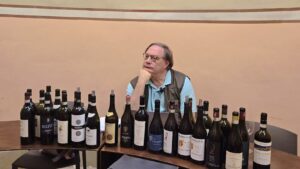Nestled in the rolling hills of Paso Robles, California, Tablas Creek Vineyard stands as a beacon of excellence in the world of wine. With a rich history rooted in Franco-American collaboration and a steadfast commitment to sustainable farming, this pioneering winery has carved out a unique place in the American wine landscape. Visiting Tablas Creek is not just a tasting—it’s a super exciting and academic experience, offering a deep dive into the art and science of winemaking. The world of wine is undeniably lucky to have Tablas Creek, a winery that not only crafts wonderful wines but also preserves rare grape varieties that might otherwise have vanished forever.

A Storied History
Tablas Creek’s origins trace back to a transatlantic partnership between two titans of the wine world: the Perrin family of Château de Beaucastel in Châteauneuf-du-Pape, France, and Robert Haas, an American wine importer with a passion for Rhône varieties. In the late 1980s, the Perrins and Haas set out to find a New World site that could replicate the terroir of Châteauneuf-du-Pape—limestone-rich soils, a Mediterranean climate, and rolling hills. After an extensive search, they landed in Adelaida, a subregion of Paso Robles, in 1989. The site’s chalky limestone soils, similar to those of their French homeland, and Paso’s warm days and cool nights made it an ideal canvas for their vision.
The winery was officially founded in 1990, with the first vines planted in 1994. To ensure authenticity, Tablas Creek imported cuttings of all 14 traditional Châteauneuf-du-Pape grape varieties directly from the Perrin family’s estate. This ambitious endeavor wasn’t just about replication—it was about preservation. Many of these grapes, such as Bourboulenc and Vaccarèse, were at risk of extinction due to their limited cultivation. Tablas Creek took on the noble task of safeguarding this genetic material, ensuring that these varieties wouldn’t perish forever. Today, the winery stands as a living archive of Rhône viticulture, blending Old World heritage with New World innovation.

Farming with Purpose
At Tablas Creek, farming is as much a philosophy as it is a practice. The winery is certified organic and biodynamic, reflecting a deep commitment to sustainability and harmony with the land. The team, led by winemaker Jason Haas (son of Robert Haas), embraces a holistic approach that prioritizes soil health, biodiversity, and resilience. Sheep graze the vineyards in the off-season, naturally controlling weeds and fertilizing the soil, while cover crops enhance the ecosystem below ground.
One of the winery’s most distinctive features is its approach to vine spacing and canopy management. Unlike many modern vineyards that favor tight spacing for maximum yield, Tablas opts for less dense plantings and allows vines to carry a bit more fruit. This deliberate choice slows the ripening process, a critical factor in Paso Robles, where the warm climate has no trouble achieving ripeness and concentration. As Jason Haas often points out, the goal here isn’t power—it’s elegance. And elegance they’ve achieved, crafting wines that balance richness with finesse.

A standout example of their innovative farming is an experimental block where rows of Grenache and Syrah alternate in a symbiotic dance. The Syrah vines are trained higher, their enthusiastic canopies casting shade over the lower-trained Grenache vines below. This creative technique mitigates the intense Paso sun, protecting the Grenache from over sun exposure and preserving its vibrant acidity and delicate flavors.
Another highlight is their block of Mourvèdre, a darling variety for Tablas Creek. Unlike most of their vines, which are grafted onto rootstocks to combat phylloxera, this Mourvèdre is planted own-rooted. The variety sometimes struggles when grafted, losing some of its vigor and character. In Paso’s dry climate, rootstock choices tend to be vigorous to compensate for low rainfall, but Tablas has found that own-rooted Mourvèdre thrives in their limestone soils, producing wines of remarkable depth and complexity.
The Wines: A Celebration of Rhône Heritage
Tablas Creek is one of the few wineries in the world to grow and vinify all fourteen Châteauneuf-du-Pape grape varieties: Grenache, Syrah, Mourvèdre, Counoise, Cinsault, Terret Noir, Vaccarèse, Muscardin, Bourboulenc, Clairette Blanche, Grenache Blanc, Picardan, Picpoul, and Roussanne. This dedication to diversity is more than a gimmick—it’s a testament to the winery’s belief that each grape has something unique to offer. Some of these varieties, like Bourboulenc and Vaccarèse, have proven to be stars in their own right, producing excellent wines that showcase their individuality.

The white wines at Tablas Creek are particularly noteworthy. With the exception of Vermentino—the only non-Châteauneuf-du-Pape white grape in their portfolio—and Picpoul, all of their white wines undergo malolactic fermentation. This process softens the acidity and adds a creamy texture, resulting in whites that are both structured and opulent.
The reds, anchored by classics like Mourvèdre, Grenache, and Syrah, are equally impressive. The flagship Esprit de Tablas wines—both red and white—blend multiple varieties into harmonious, age-worthy expressions of the estate. These wines are a masterclass in balance, weaving together fruit, minerality, and spice with a finesse that rivals the best of the Rhône Valley.
A Tasting Experience Like No Other
Visiting Tablas Creek is an adventure for the senses and the mind. The tasting room, set against the backdrop of sprawling vineyards and limestone hills, offers an immersive journey into the world of Rhône wines. Knowledgeable staff guide guests through the lineup, sharing stories of the grapes’ origins, the winery’s farming practices, and the meticulous care that goes into each bottle. It’s an academic experience that enlightens even seasoned wine lovers, and the excitement of tasting rare varieties like Bourboulenc or Vaccarèse is unmatched. Every sip tells a story of preservation, innovation, and passion.

In ultimate analysis, the winery, and all it stands for and does, are gifts to the wine world. Tablas Creek Vineyard is more than a winery—it’s a legacy. By saving genetic material that might otherwise have been lost and proving that these obscure grapes can produce world-class wines, Tablas has enriched the global wine community. Their commitment to elegance over excess, coupled with sustainable farming and a reverence for tradition, makes them a standout in Paso Robles and beyond. The world of wine is indeed lucky to have them, and for anyone fortunate enough to taste their offerings, the experience is nothing short of extraordinary.

The wines in this tasting
The wines in this report were all tasted at the winery in early 2025.




